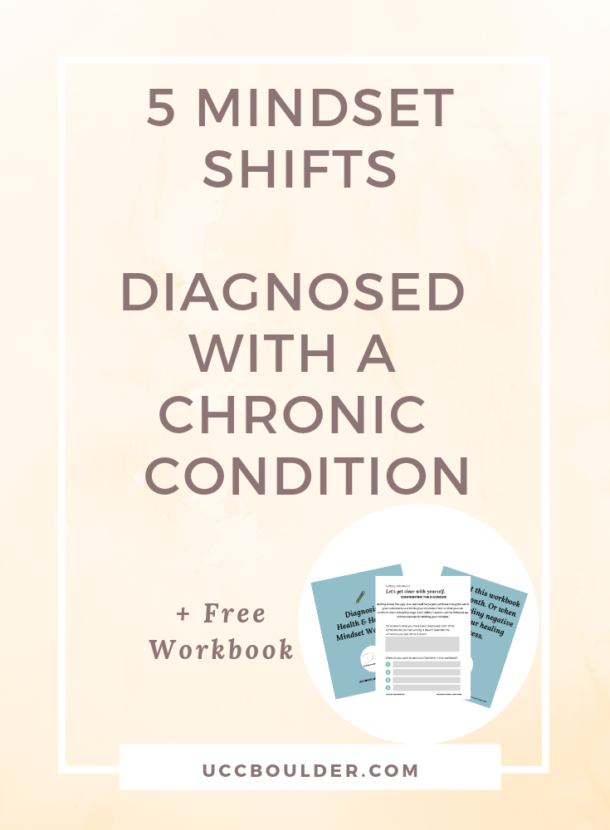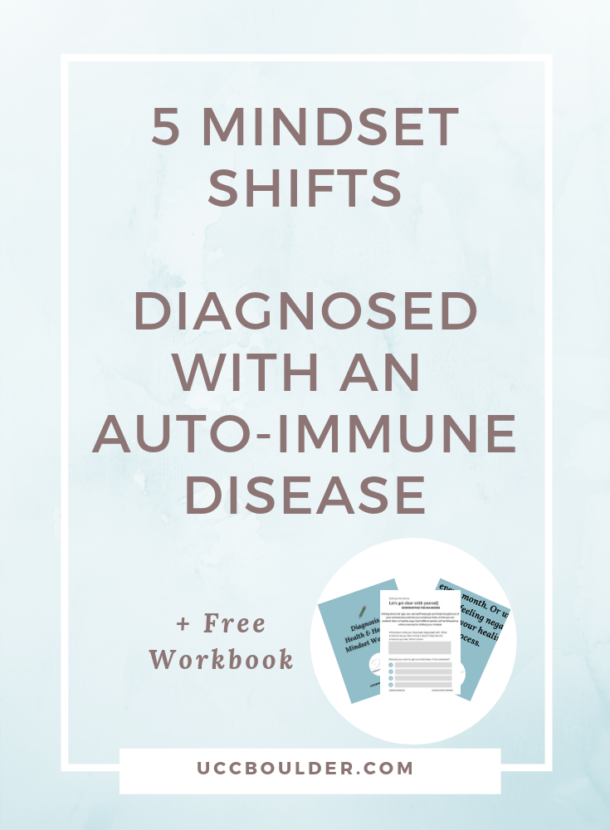[thrive_leads id=’1390′]
5 Mindset Shifts When Diagnosed With A Chronic Condition
There are many different types of diagnoses that a doctor might give to you. You might receive a diagnosis for a chronic condition that you may have to deal with the rest of your life, like an autoimmune disease or a neurological disorder. Cancer could be your diagnosis. Or maybe a psychological disorder where you are diagnosed with depression or anxiety. Perhaps your diagnosis could look like a chronic virus or a chronic infection. All of these are chronic conditions that take a huge toll not only on our physical bodies but on our minds as well.
If you have ever received a diagnosis for a chronic condition.
If you have ever received a troubling diagnosis, then you will immediately understand the following thought patterns in this article. Of which I’m going to encourage you to break. There is a very common pattern of thinking among folks who receive unsettling news from their doctor.
If someone in your life has been diagnosed with a chronic condition.
Or. Maybe you are reading this because you KNOW someone who received a troubling diagnosis. In which case this article may bring you some empathy for you as the reader. I encourage you to share these ideas with someone who might be suffering the psychological aftermath of a diagnosis for a chronic condition.
A little pro tip: people who have a troubling diagnosis usually don’t want to be forwarded an article that says “hey you should read this.” This leaves the impression that you think they have a poor mindset around their health. (Even if they do), then it might leave that person feeling hostile and less likely to be open to addressing their mindset around their health, and their diagnosis. I recommend organically having a conversation around some or all of these topics. As to not offend someone with a chronic condition. Or, you could share this article on your favorite social media page, so those in your network struggling with chronic conditions might stumble upon it that way.
I know we all mean well when it comes to helping someone with a chronic condition, and if intentions were the only thing that mattered, I think there would be a lot more happy couples in the world! Unfortunately, perception means a great deal to people. So even if your intention is pure, be mindful about never attacking someone with a chronic condition (or making them feel attacked).
“Receiving” a diagnosis.
It’s an interesting thing when you are given a diagnosis. I actually find the whole phrase quite strange. A doctor will *give* you a diagnosis. Or, you *receive* a diagnosis. Like, here, it’s yours. You gotta deal with it now.
That’s kind of how it feels, it is like this unhappy bag of crap someone hands to you. And then you’re left feeling one or all of the following:
- How much of my life is this going to consume?
- Why did this happen to me?
- This sounds like a lot of money I’m going to have to spend.
- How can I give this back? I definitely do not want to be given this.
As a doctor myself, it’s interesting being on the other side. It’s interesting to be the *giver* of a diagnosis. A few years ago I was a *receiver* of a diagnosis of a chronic viral infection.
Related Article: Natural Healing From CIN 3 High-Grade Cervical Dysplasia
There is a certain element of healthy detachment that comes with being a physician. You deliver/give a diagnosis to someone, and then you have to leave it in their hands. Of course, every doctor does their best to be empathetic and connect with their patients, but it has to be done in a way where the doctor doesn’t “take it home” with them at the end of the day. Kind of reminds me of a Grays Anatomy episode. Have you ever looked a doctor and thought, dang, you’re kind of aloof and cold. Maybe your doctor spent 15 years being so emotionally invested in each and every single patient, and then took that emotion home with them every day. Day in and day out. For 15 years. Maybe you’re just now meeting the hardened version of this physician.
I suppose I bring up this point because I have been on two sides of this coin. Both the difficult diagnosis giver and the difficult diagnosis receiver. I have felt frustrated with the unhappy bag of crap my doctor handed to me, and projected that frustration onto my doctor (and then, myself). I have also had to deliver a few unhappy diagnosis’s myself. Having been on both sides of this, I can deeply empathize with both parties.
If only everyone reading this article could gain all sides of the experience. Imagine the emotional growth we could all gain if we got a small peek into the person on the other side of the conversation in the exam room.
As Plato so wisely said: Be kind, for everyone you meet is fighting a hard battle.
Does that one give you chills? It stops me every time.
Shifting to the original topic of this post: let’s look at some mindset shifts around a chronic condition diagnosis… Sometimes in life, we cannot take full control of our physical bodies. One thing we definitely have control over is our mind and our thoughts. Our mindset can shift the way we feel physically, IMMENSELY. You may not be able to reverse cancer with your mind, but you can certainly reverse engineer some of the mindsets around a diagnosis of a chronic condition.
[thrive_leads id=’1390′]
1. End the negative self-talk & self-sabotage that comes with a diagnosis of a chronic condition.
This wouldn’t be a helpful article if I didn’t start with this one. Before your eyes glaze over and you move on to the next section, hang in with me for a moment. Have you ever heard the phrase ‘you are what you eat?’ How about… ‘you are what you think.’
When I received my diagnosis, one of the FIRST thoughts was: my body betrayed me. My body let me down. I’ve spent years caring about organic foods and working out and now my body failed me. I would look inward and think to myself, ‘why is this happening,’ and ‘hey body, why are you doing this to me? Have I not treated you well?!’
This might seem silly at first read, but if you’re reading this and you’ve ever been diagnosed with a chronic condition like an autoimmune disease, or a neurological disorder, or cancer, or chronic infection, or a psychological disorder… then you know that detached feeling from your body. That feeling of “that can’t be happening to MY body.”
Sometimes we try to push the diagnosis to the back of our mind. We bury it DEEP. But when the symptoms of a chronic condition decide to make themselves un-hideable, it’s sometimes difficult to not ask our body: ‘why are you doing this to me?’
A better question might look like this: ‘What are you trying to tell me?’
Our bodies are pretty smart creatures. When our symptoms flare up, it’s usually a good indicator that we need to figure out what our body is trying to tell us. Slow down? Do more? Stop drinking? Let’s cut back on unhealthy food and sugar?
You only get one body (as far as we know). Try to resist the self-sabotage and negative self-talk towards your body. It is the engine that allows you to experience life as it exists. With every breath of life, there is hope. With every morning you get to see the sunrise, there is something to be grateful for.
Sounds cheesy. But it works. I promise.
2. Even with a chronic condition: you are still capable of healing.
Just because you have a chronic condition, does not mean that your body is no longer capable of healing. It is not permissible for you to give up hope that the body can heal and regenerate so that you can live a better life. Despite the diagnosis you might have been given – your body still has an amazing capacity to heal.
Never. Ever. Forget this mindset shift.
Imagine this with me…. You are opening a jar or mustard (maybe you don’t like mustard, pick your favorite glass jarred condiment), and the glass breaks under your hands, slicing the middle of your hand open. No matter what chronic condition you have been diagnosed with, you are still capable of healing.
Unless you have some rare clotting disorder, you’re gonna heal. In the next day or so, you will form a blood clot and a scab will appear. It will begin to itch. You’ll try really hard not to pick it off once it starts to detach from you. And eventually, you will have new cells, new skin, and new life underneath that scab. In most cases, you will forget that it ever happened.
It’s likely that you will never have to look at a bleeding cut and WILL that cut to heal. It’s much more likely that you will slap a bandaid over this cut and just let your body do its thang.
It’s about time we start giving our bodies the healing credit it deserves. Our body is not a fragile piece of glass waiting to break at any moment. You are strong. You are resilient. Remember that while you’re sleeping, your body is continuing its very best to heal at 100% of its capacity to heal and regenerate every cell, tissue, and organ in the body.
Most importantly, do not let the diagnosis of a chronic condition let you forget the simple fact that your body is still capable of healing. Sometimes it just needs a little bit more help in order to do so.
Related article: Naturally Reduce Inflammation So Your Body Can Heal
3. You have nothing to be ashamed of.
This one’s a biggie ya’ll. Ever felt a tiny twinge of shame after a diagnosis? *Slowly raises hand*
Sometimes this one happens for no good reason at all. Inherently we feel dirty, or broken, or ashamed that we are not the epitome of perfect health. Maybe we blame ourselves. Maybe our diagnosis has a direct correlation with OUR actions. Whether we want to admit it or not, many times the diagnosis of a chronic condition comes from years of poor lifestyle choices on our behalf. And that my friends, well that is one difficult pill to swallow.
But do you know where shaming yourself gets you? I’ll tell you this: it does not get you to a place of gratitude and happiness with our bodies or our lives. Shame is like blank ink that bleeds into different cracks in our lives. It leaves us unmotivated to hit the treadmill at the gym, even if we know we need it. It prevents couples from making love. It slowly creeps into small, but important, decisions we make on a daily basis.
Most of the time it’s completely self-inflicted. It’s much more likely that someone will feel ashamed of themselves and their diagnosis. It’s much less likely that a friend, or parent, is ashamed of someone else’s diagnosis.
Living in shame of a chronic condition only shackles you to your diagnosis. Embrace your situation and embrace taking the steps to try to approach it with grace and poise.
4. Some of the best healing happens from the inside-out. Not the outside-in.
We are going to drop into some chiropractic philosophy a little bit. It’s very difficult to find a pill, lotion, or potion that will CURE you. Those are all considered outside elements that we are attempting to use to force the body into healing. Many times, they are attempts to hide the symptoms so we can forget about the existence of the chronic condition. Have you seen those popular memes of an iceberg on social media? Where the tip of the iceberg is above water, while the other 80% sits below the surface? What if we STARTED by focusing on healing everything below the water’s surface, rather than starting with medicating the small part above the surface.
The secret to long-lasting cures? Figuring out how to get your body to heal itself. How do you heal from the roots of your chronic condition, rather than just trying to manage the symptoms with external remedies? Learning to amp up your body’s immune system to do the hard work for you takes some serious dedication. To heal from the inside-out. But it also reaps the most rewarding results. I talk about that a lot more here.
5. There is no process that does not require time. This is especially true when managing a chronic condition.
I’ve mentioned in this post that our bodies are pretty amazing healers. I should add a caveat to this statement: you just have to give your body time to do so. It’s much more likely that small lifestyle changes will need to be made, slowly and consistently over time, that will lead to better health for you and your body. I
It is not the case for most people to have one singular day or event where they go – I’M HEALED. When you are 2 weeks in, 2 months in, an entire year in, and you don’t feel you have complete resolution of your chronic health condition: this is where this healthcare principle plays a strong role. There is no process in this life, which does not require time.
It’s time we start celebrating small wins. No win is too small. Have you been able to slightly lower your high blood pressure medication? Maybe you’ve lost 7lbs. Maybe you got a test result back that is not resolved, but maybe it was knocked down a few levels in severity? Maybe you’ve cut your drinking in half and gave your body a break.
Our quick and fast way of living has also crept into our way of healing as well. Quick and fast healing is expected. And if it doesn’t happen that way, we feel disappointed and want to turn to some outside source to fix our chronic condition ASAP. Consistent positive changes to your life will undoubtedly help your body heal, and when your body heals you typically feel a lot better too 🙂
[thrive_leads id=’1390′]
To Recap.
Your diagnosis does not define you. Consistency is key. Eliminating your negative self-talk is key. Believing your body is capable of healing is key. Eliminating shame is key. Understanding that we must *also* address chronic conditions from the inside, not just the outside, is key. And having unwavering patience is key.
Love this post? Want to reference it later?
Pin it!
The information contained in this post is not intended to diagnose, treat or cure any diseases. It is not a substitute for regular medical care. If you are on medications or have any medical conditions, please consult with your primary healthcare provider before making any changes to your healthcare approaches.




